In a country that listens only to film music, regional rock musicians are turning up the volume. Chandrima Pal tunes in.
A year ago on a television show, journalist Vir Sanghvi hosted the turban-wearing, guitar-playing, bespectacled Punjabi folk-rock singer Rabbi. As the singer moved from his signature Bulla Ki Jana Main Kaun to All Along the Watchtower, Sanghvi said, "When a Sardar on national TV jams with Sufi and Bob Dylan, you know times are truly changing."
Like everything else in India at this point in time, the story of indigenous rock is changing more swiftly than the eye can see.
The story is in itself not a new one. Ever since the swinging sixties, places like Calcutta and the Northeast have had boys belting it out with guitars and drums. Vernacular rock music in India is not new either. Mohiner Ghoraguli, a band of songsters from post-Naxal Calcutta, became cult city icons with songs like Prithibi in the late 1970s, to give just one example.
But what is new today in India is the national attention the regional rockers are garnering. Prithibi is now heard across India, and wherever Indians live across the globe: Calcutta-rocker-turned Bollywood music director Pritam Chakraborty bought the rights and used the tune in the super-hit Bheegi Bheegi from the movie Gangster.
In the late 1990s, bands like Indian Ocean and Euphoria rode to success using the familiar quaintness of Indian folk with elements of rock in an attempt to reach out to young listeners. The quest to create a sound that is Indian in spirit and global in its outreach had finally struck a happy, saleable avatar.
But the journey is far from over. The new sounds of India are coming from as myriad sources as IIT campuses and night clubs. And the music is diverse too. If you have a rock band singing in Bengali about love and heartbreak, you have a guitar strumming software engineer 'appealing to the good lord for a second chance'. What binds them is their inherent Indianness.
Are you a musician too? Are you part of a band? Share videos of your performances with us.
Simply mail us the following:
Name of band/musician:
Based in:
Genre:
Highlights of career:
Contact:
Upload your video on iShare, email the link to getahead@rediff.co.in and if it's interesting enough, we'll feature it right here!

Kannada Cool: The Raghu Dixit Project
Image: Raghu DixitPhotographs: raghudixit.com
He is a qualified microbiologist and a trained Bharat Natyam dancer from Mysore. He has worked as ad jingle maker, is now settled in Bangalore, strums a guitar, wears bells on his feet, and a colorful lungi with chunky tribal jewelry.
"It was a very conscious effort to look the music we play," says Raghu Dixit. "I have tried many options, but nothing really stood out as unique as what we have today. Many trials and many failures later, I thought we should represent what we play as music and what we are as individuals."
The Raghu Dixit Project is one album old -- released by Bollywood composer duo Vishal-Shekhar -- but its credits include three hit Kannada film scores and 49 live shows in 2008 alone. Dixit's eye-catching get-up contributes to the way the music is received, the singer-songwriter reasons.
"People don't come to concerts only to listen to the music. They come to see a live act, a performance, a persona and the energy. If it was only the music, they might as well listen to the CD!"
Dixit describes his music as Indo-world folk-rock. He sings in Kannada, Hindi and at times throws in a few English lines too. But whatever be his language, the soul of the Raghu Dixit Project is its production. Wah wah guitars meet folksy tunes, drums lush up ethnic ballads.
"The fact that I have some of the best musicians, and hugely experienced ones at that, gives me the added advantage," says Dixit. "Everyone knows what to do; I am only there to steer them towards a cohesive sound."
Bangla Bandstand: Cactus
Image: CactusAny Bengali boy who has survived heartbreak and the Left Front will have heard Bengali rock band Cactus at some point in his life. Having being around for 16 years -- despite the inevitable line-up changes -- helps. What helps even more is that they've suddenly found a bigger canvas. They sang for the Bollywood movie Metro, and performed the theme song for the Kolkata Knight Riders, the Indian Premier League Twenty20 cricket team owned by Shah Rukh Khan, and for SRK on Farhan Akhtar's television chat show Oye It's Friday. Now they're featured regularly in the Indian version of Rolling Stone.
"Earlier," says Shibaji, aka Baji, the band's drummer, "if we aimed for a crowd of 1,000 we would get 40. Now when we aim for a crowd of 100,000 we get 40,000. But the struggle continues."
Isn't Cactus one of the most successful bands to have come out from Kolkata, a city with an average of a band per para (neighborhood)? "The struggle," Baji says, "is to convince people that vernacular rock exists and can flourish in our country."
He lists countries like China and Japan, where rock music in the native tongue has a huge following, unlike in India where the 'rockers' look down at vernac bands. "And that is a real pity," Baji says.
Cactus members are celebrities in Bengal, making appearances as reality show judges, at who's who parties and the like. At every college campus, you will find guitars strumming their songs. Indeed 'band' music, which got a fresh lease of life in the Bengali psyche with the arrival of guitar-toting singers like current member of parliament Kabir Suman in the early 1990s, is now a full-fledged genre.
"The audience has been won over, it is the industry which provides the infrastructure support which needs to be convinced about the viability and the identity of a band," argues Baji.
Their plan for the next stage is to hit Bollywood. "We realised we have to deliver a few hit tracks in Hindi to whet the audience's appetite and to draw them to our own music."
Like the other successful Bengali rock bands like Chandrabindu, Bhoomi and Krosswindz, Cactus has played across the nooks and crannies of the state. But ask about bizarre experiences, and they recount one in Los Angeles, performing for a predominantly Bengali crowd during the annual Durga Puja celebrations.
"We were given a single amplifier and asked to make do with it," recalls Baji. "The organisers reasoned, if it was good for the veteran singer Manna Dey, it should be good enough for us!"
There is more on Cactus here. And if you like Bangla Rock, you may also want to listen to Krosswindz, Lokkichhara, Rupam, Chandrabindu etc. There are scores of independent artistes and almost every Kolkata neighborhood has its resident guitar hero and a band that practices in the attic room till midnight.
The rustic act: Swarathma
Image: SwarathmaBangalore-based Swarathma are the new kids on the block, but they've already bagged a record deal with Virgin records and had a country tour with an album launch. They have also toured the United Kingdom and Singapore as a part of a British Council project.
They sing mainly in Hindi, with some songs in Kannada. Like Raghu Dixit, Swarathma believe music, when performed live, has a lot to do with dramatic stage acts and getups. The frontman sports a dramatic Afro hairdo, wears a Rajasthani steed and a cape, while the others turn up in colorful dhotis, jodhpurs and what-have-you.
Jishnu, the lead guitarist, says, "The stage act, along with the music, the band members and the world around us, is still evolving. It stems from the belief that a person coming to a Swarathma show has five senses -- maybe six. Why not appeal to as many of them as possible? The attire comes from the thought that there are six different individuals, each with his own taste, own sense of personality on stage. Each person's attire has a little bit of him in it."
Swarathma's music is still a work in progress, but the band's stage drama is definitely a hit. The band's most visible prop, the steed or ghodi, has travelled with them right from the finals of the battle of the bands talent hunt that catapulted them into fame to places as far away as Singapore and London.
"I guess it was inspired by the folk arts of Rajasthan, we gave it a different twist," says Pavan, the vocalist.
But for this quirky Bangalore bunch that draws inspiration from Jimi Hendrix to Kabir, Sivamani to Steve Vai, the best playing often happens at small, intimate gatherings.
More on Swarathma here. And if regional rock is your poison, you may want to listen to Avial. The avant garde Malayalam-rock band was formed only in 2003, but has a significant cult following. Combining superlative musicianship with vernacular lyrics, One of Avial's popular songs, Nada Nada, celebrates a sort of going back to the roots, the fishermen, the tribals and the men of the soil who are one with the elements and at peace. Add screaming guitar riffs and driving drums, and you have Avial, the sharp, tangy dish.
Hindi Hai Hum: Faridkot and Prayag
Image: FaridkotChances are, you haven't heard these Hindi rockers yet. But if they keep going the way they are, chances are you will, soon. Delhi-based Faridkot, which lost out in the finals of an Indian television reality show aimed at picking India's best band, is barely a year old.
Has the reality show exposure translated into gigs or recording deals?
"Talks are on," says Rajarshi Sanyal, guitarist of the band. "But we'll wait until the next gig season to see how things have really changed for us." Even though the twenty-something members often seem at a loss for words when asked questions about their music, they are not running out of things to sing about.
Two years into the scene, with a busy last gig season -- which saw them perform in far flung places like Chandrapur, Maharashtra, near where there were reports of a man-eating tiger on the prowl -- behind them, Mumbai-based Prayag is one of the more popular up and coming bands around. The band's biggest high came last year, when at a show in Hyderabad along with Pakistani rock band Jal, a 2,000-strong crowd sang along with their originals.
"That was certainly the biggest compliment for our music," says lead singer Pranab Gohain. Prayag's music features some heavy duty guitar and drum segments, livewire performances. And the band has a penchant for getting the audience involved. Like many of their contemporaries, Prayag's band members juggle day jobs with their passion for music, often sneaking out of their offices to make it in time for the crucial sound-check.
Is India listening?
While live shows may be rocking -- bands like Kailash Kher's Kailasa and Indian Ocean frequently tour abroad and perform extensively in India -- Bollywood remains the ticket to the big time. In fact, Bollywood remains the only viable music as far as the recording industry is concerned.
"We have been promoting regional and independent artistes through various initiatives," says a manager at a top-lining record company, "but, honestly, this has earned us nothing but goodwill. Nothing sells like Bollywood, and there too, traditional modes of sales and distribution have run their course. Regional artistes are better off performing live."
Bollywood itself has embraced rock, with a new breed of filmmakers and composers. And that might hold a hint to the future.
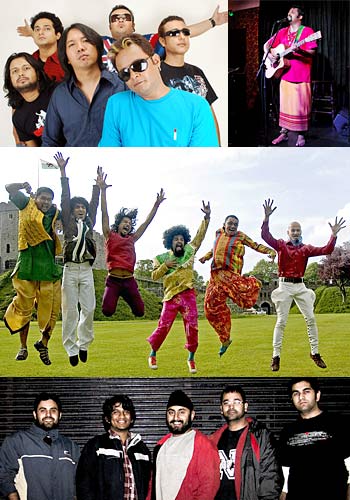
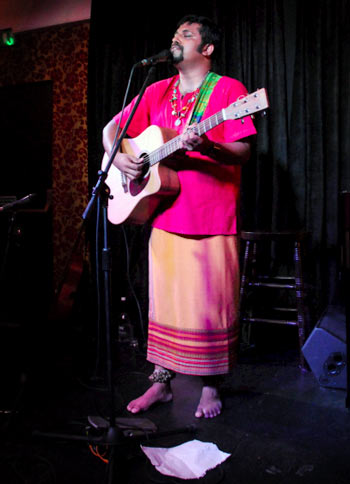
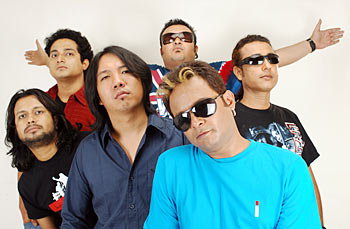
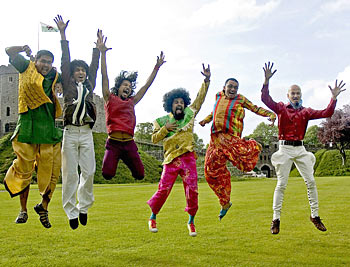
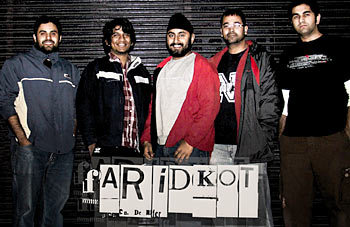
Comment
article